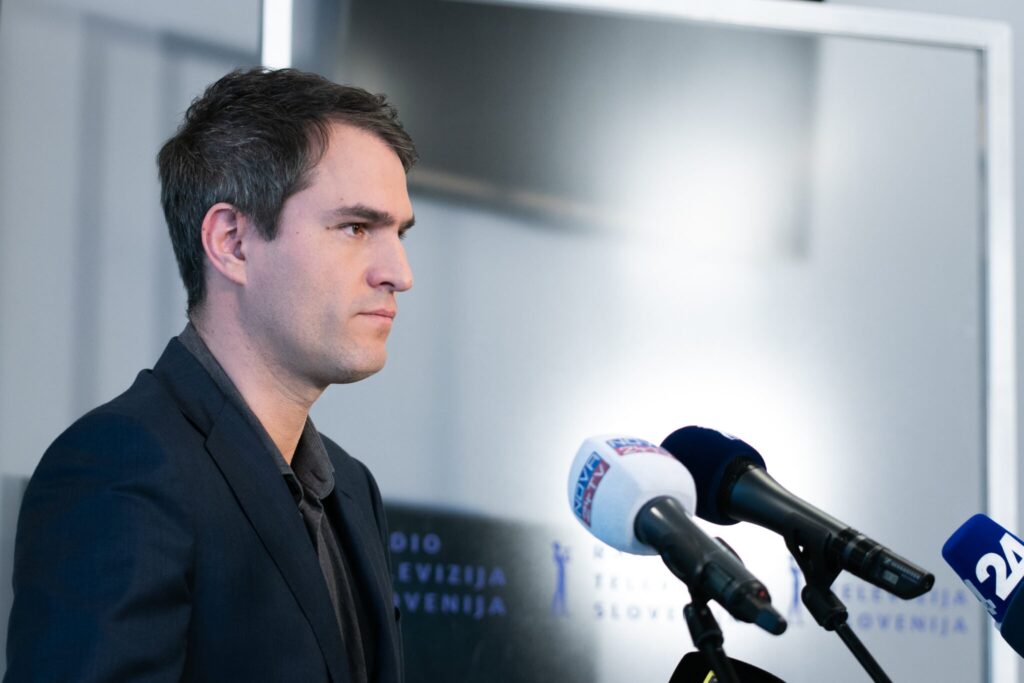On Thursday, we saw the last act of the political usurpation of the national media outlet, Radio-Television Slovenia (RTVS). The pluralisation attempt has thus ended with the dismissal of the now-former acting Director-General, Andrej Grah Whatmough, who will be replaced by Zvezdan Martič, the new President of the Management Board of RTVS. In his response, Grah Whatmough said that the reasons for his dismissals were all made up, and according to him, the RTVS Council does not even have the authority to dismiss him, which means that its members have committed a criminal offence. He has thus already announced that he intends to seek justice in court.
In his public presentation, the new head of RTVS Management Board, Zvezdan Martič, made it clear that his weak points are finance and law. Namely, he comes from the core of activist journalists of the national media outlet. The other people to join him on the Management Board are Simon Kardum, a former politician and cultural worker, who predicted at the latest RTV Council meeting that the times ahead would be difficult – and he did it with a counting rhyme. His choice of words gave the public the impression that it was, in fact, a prediction of political purges of staff. In addition to Kardum, Andrej Trček will also be on the RTV Management Board.
However, the new Board is not yet operational, as the Workers’ Director has not yet been appointed, and the Board can only become operational once all four members have been appointed. The name of the elected Workers’ Director is not expected to be known until mid-August. Sports journalist Franci Pavšer and RTV Workers’ Council President Robert Pajek have so far qualified for the second round. The vote will take place on the 16th of August, according to the Slovenian Press Agency (STA).
In line with the potentially constitutionally controversial amendment to the Radio-Television Slovenia Act, the institution no longer has a supervisory board. The Finance Committee will give a preliminary opinion to the RTVS Council on the draft statutes, financial plan and annual report of the RTVS, as well as on the proposal to use any surplus of the RTVS’s revenue over expenditure.
The real reasons for the dismissal
The former management team of the institution in question, which was legally appointed under the previous government, was a thorn in the side of the activist group of journalists from RTVS, as well as the political left, which had controlled the public institution for years beforehand. After last year’s elections, the latter decided to change the leadership of the institution prematurely. To this end, it adopted an amendment to the Radio-Television Slovenia Act – thus changing the governing bodies – under the expedited procedure designed for the adoption of laws in times of war, natural disasters, or grave danger to democracy. It created the RTVS Council, which is controlled by the political left through non-governmental organisations and institutions, which also means that the Council has now become “bulletproof” in terms of its political and worldviews. The amendment then passed a referendum review, but it got stuck in the Constitutional Court. The petition for a review of the constitutionality of the law was filed by Dr Peter Gregorčič and Dr Matej Avbelj. The Constitutional Court first suspended the implementation of key articles of the amendment, but it later lifted its own suspension.
The functioning of the Constitutional Court has caused quite a stir in the legal community, as the reasons for the suspension have not ceased to exist, and it has become increasingly clear that the Constitutional Court has succumbed to political pressure in this decision. Government politicians reportedly called the Constitutional Court judges, the Speaker of the National Assembly, Urška Klakočar Zupančič, demanded to see the case file, and even the European Commissioner Věra Jourová visited the premises of the Constitutional Court.
The fact that this was a political takeover and not a “depoliticisation”, as the authorities still claim, was recently finally admitted by the Prime Minister himself. “I feel very frustrated, especially because I was naive and believed that Radio-Television Slovenia could be depoliticised in a civil and legal way. […] We, along with the civil society, wanted to skip this phase where the Freedom Movement party (Gibanje Svoboda) coalition would take over RTV. And that was our mistake,” the Prime Minister told the STOPkast podcast.
Of course, the RTVS Council, which is now headed by an activist from the ranks of the pro-government NGOs, cannot write in an official document that Grah Whatmough should be dismissed for ideological and political reasons. And therefore, they accuse him of not providing them with the necessary legal assistance after the head of the legal department of RTVS was expelled from the first meeting of the RTVS Council, adding that some of his actions did not fall within the scope of “current affairs.” They also criticised him for buying graphics worth 37,700 euros, selling shares in Eutelsat Communications and concluding certain contracts with employees because – in their opinion – he should not have done any of that.
Žiga Korsika


